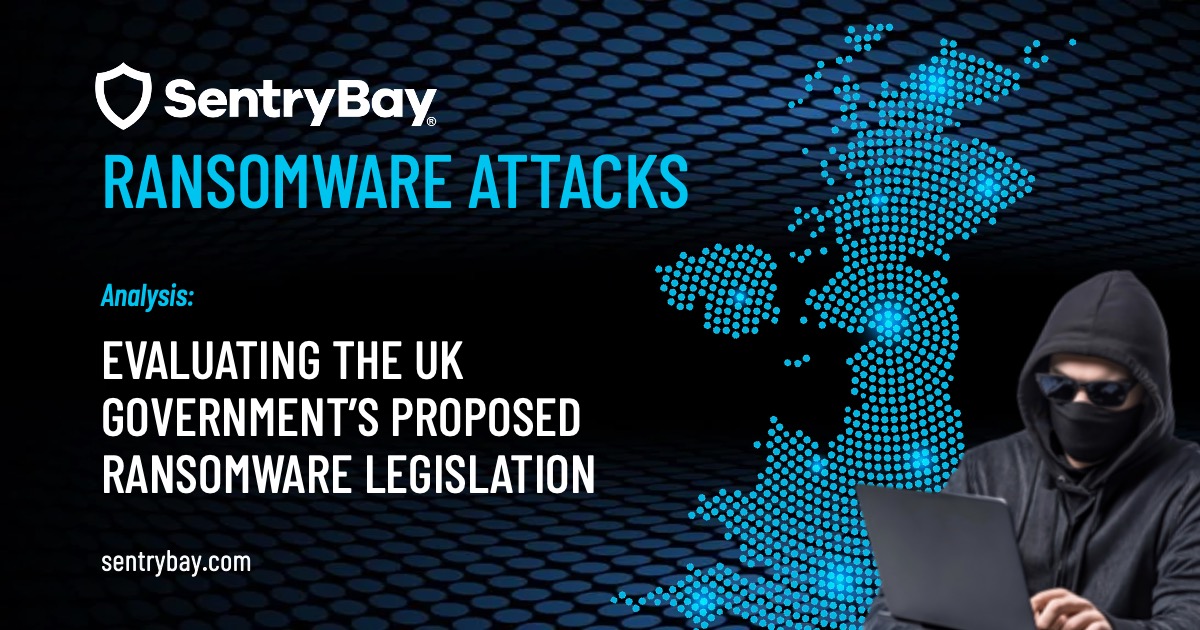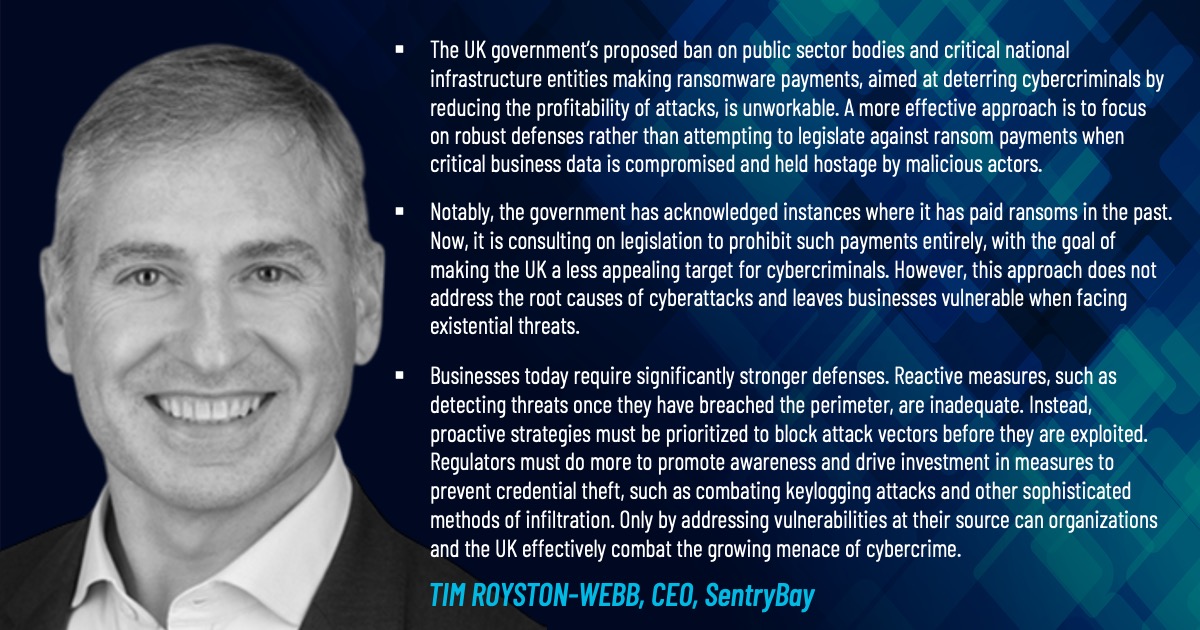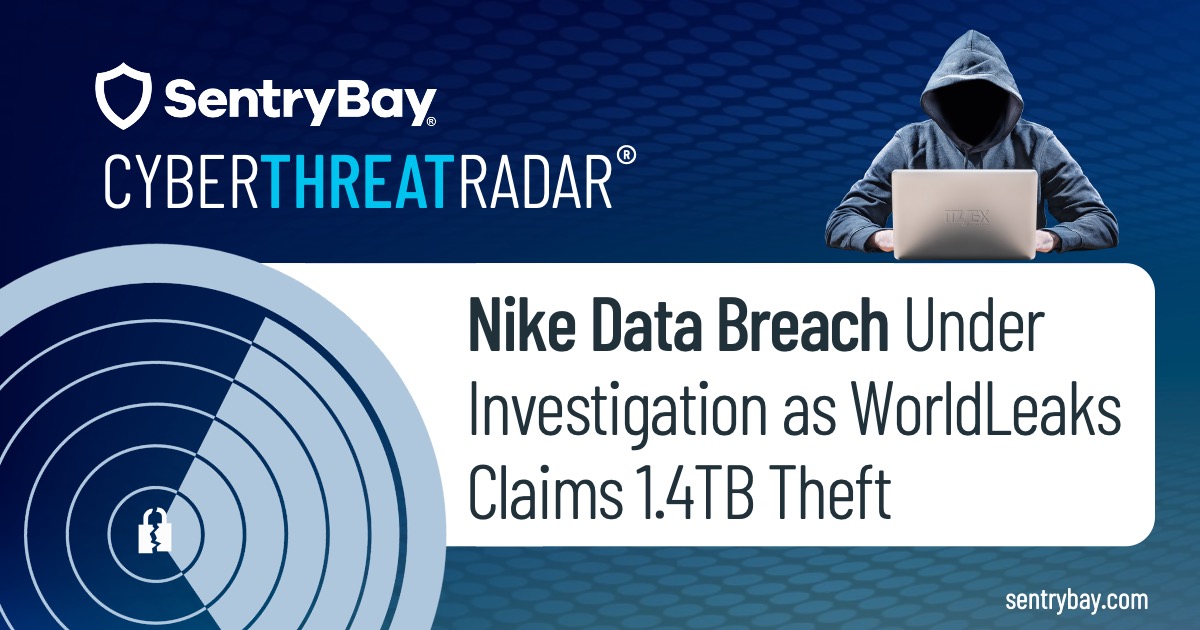
The UK government has unveiled a series of ambitious proposals to protect critical public infrastructure and businesses from ransomware attacks. These measures aim to curb the growing threat of cybercrime, which costs the UK economy billions annually. However, industry experts, such as Tim Royston-Webb, CEO of endpoint isolation technology leader SentryBay, have expressed concerns about the feasibility and effectiveness of these proposals, advocating for more robust proactive defenses.
The Government’s Ransomware Proposals
The proposed measures focus on three key areas:
- Banning Ransom Payments for Public Sector and Critical Infrastructure
Expanding the current prohibition on ransomware payments by government departments, this measure seeks to include public services such as the NHS, schools, and local councils. The rationale is to reduce the attractiveness of these targets by eliminating the financial incentives for attackers. - A Ransomware Payment Prevention Regime
This initiative aims to increase the National Crime Agency’s (NCA) involvement during ransomware incidents. It includes offering victims guidance, tracking criminal ransom demands, and potentially blocking payments to known cybercriminal groups and sanctioned entities. - Mandatory Reporting of Ransomware Incidents
Requiring organizations to report ransomware attacks will boost law enforcement intelligence, enabling more effective targeting of prolific and damaging cybercriminal networks.
These measures align with the government’s broader Plan for Change, which emphasizes reducing crime, ensuring economic stability, and enhancing public safety.
Ransomware’s Persistent Threat to the UK
According to the National Cyber Security Centre (NCSC), ransomware is the most immediate and disruptive cyber threat to the UK’s critical infrastructure. Attacks in 2024 included incidents targeting a supplier to London hospitals and the Royal Mail, causing widespread disruption. The NCSC’s Annual Review reported managing 430 cyber incidents between September 2023 and August 2024, 13 of which were deemed nationally significant.
Despite these threats, a mandatory reporting regime might face challenges. A similar initiative in 2021 required energy companies to report cyberattacks. However, no reports were submitted, despite evidence of numerous incidents, raising doubts about the efficacy of such mandates. This history suggests that organizations may remain reluctant to disclose breaches, even when required by law. For further context, you can read about the 2021 initiative here.
SentryBay CEO: A Call for Stronger Defenses
SentryBay’s CEO Tim Royston-Webb has expressed reservations about the proposed measures, particularly the ban on ransomware payments for public sector organizations. While well-intentioned, he argues that such a ban is impractical and fails to address the underlying vulnerabilities that make ransomware attacks possible.
- On Payment Bans:
“The proposed ban on ransomware payments is unworkable. When critical business data is compromised and held hostage, organizations often face existential threats, leaving them with little choice but to comply with ransom demands.” - Addressing Root Causes:
Royston-Webb emphasizes that focusing on reactive measures, such as reporting incidents or legislating against payments, is insufficient. Instead, he advocates for proactive defenses that block attacks at their source.
“Regulators must do more to promote awareness and drive investment in measures to prevent credential theft, such as combating keylogging attacks and other sophisticated methods of infiltration.” - Proactive Cybersecurity Strategies:
According to Royston-Webb, businesses must adopt advanced tools to safeguard against ransomware. He highlights the importance of technologies like endpoint isolation to prevent keylogging and credential theft, which are often the entry points for ransomware attacks.

Balancing Ambition with Practicality
While the government’s proposals mark a significant step in addressing ransomware threats, their practicality remains uncertain. The history of underreporting by organizations, as seen in the 2021 energy sector initiative, raises questions about whether mandatory reporting will effectively bring ransomware incidents “out of the shadows.” Similarly, a blanket ban on ransom payments could leave organizations in untenable positions when critical data is at stake.
Conclusion: Building Resilience Against Ransomware
The government’s ransomware proposals represent a bold attempt to protect the UK’s critical infrastructure. However, as Tim Royston-Webb highlights, tackling ransomware requires more than deterrence and legislative measures. Organizations must prioritize:
- Investing in proactive cybersecurity solutions that address vulnerabilities at their source.
- Enhancing awareness and education to prevent credential theft and reduce reliance on reactive defenses.
- Testing and refining incident response plans to maintain operations during cyber disruptions.
The UK’s fight against ransomware will depend on a balanced approach that combines robust defenses, regulatory enforcement, and practical support for organizations facing this growing threat. Without addressing the root causes and learning from the challenges faced in 2021, these measures risk being another well-meaning but ultimately ineffective initiative.



